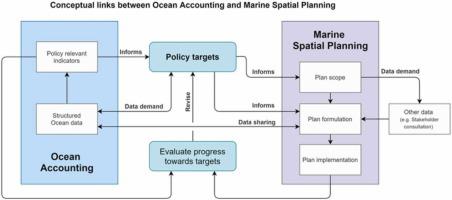Marine Policy ( IF 4.315 ) Pub Date : 2021-12-28 , DOI: 10.1016/j.marpol.2021.104936 Jordan Gacutan 1, 2 , Ibon Galparsoro 3 , Kemal Pınarbaşı 4 , Arantza Murillas 5 , Ibukun J. Adewumi 1 , Teerapong Praphotjanaporn 1 , Emma L. Johnston 2 , Ken P. Findlay 6 , Ben M. Milligan 1, 7

|
Ocean decision-makers are tasked with balancing social, economic, and environmental considerations when addressing complex policy challenges and achieving strategic objectives, such as conservation targets, or sustainable and ocean-based economic development agendas. Like many common environmental assets, oceans have been impacted by a history of imperfect governance resulting in substantial negative consequences for these important socio-ecological systems. Aligning and managing multiple trade-offs between policy targets for the management of human activities in the marine domain has been increasingly attempted using Marine Spatial Planning (MSP). More recently, Ocean Accounting (OA) has appeared as a framework that extends national, environmental, and ecosystem accounting, and provides a structure to integrate the information describing ocean ecosystems and their changing relationships with society and the economy. Globally, MSP is therefore employed to prioritise actions towards strategic objectives, while OA is being developed to centralise, standardise, and integrate ocean information. As awareness of human dependence on healthy ocean ecosystems has increased, the use of both MSP and OA has grown rapidly across the world, and intersections between the two frameworks, both geographically and theoretically are emerging. To inform both MSP and OA communities of practice, this paper explores their role in strategic ocean governance, and how synergies may be enhanced to further an understanding of complex ocean systems. Thoughtfully aligned, the two frameworks might work together with OA providing dynamic inputs to an adaptive MSP process. The early recognition of synergies between the two frameworks, and their potential for co-development, is considered imperative to advance effective ocean governance.
中文翻译:

海洋空间规划和海洋核算:增强海洋治理一体化的协同工具
海洋决策者的任务是在应对复杂的政策挑战和实现战略目标(例如保护目标或可持续和基于海洋的经济发展议程)时平衡社会、经济和环境因素。与许多共同的环境资产一样,海洋受到治理不完善的历史影响,给这些重要的社会生态系统带来了重大的负面影响。越来越多地尝试使用海洋空间规划 (MSP) 来调整和管理管理海洋领域人类活动的政策目标之间的多种权衡。最近,海洋核算 (OA) 已作为扩展国家、环境和生态系统核算的框架出现,并提供一个结构来整合描述海洋生态系统及其与社会和经济不断变化的关系的信息。因此,在全球范围内,MSP 用于优先考虑实现战略目标的行动,同时正在开发 OA 以集中、标准化和整合海洋信息。随着人类对健康海洋生态系统的依赖意识的提高,MSP 和 OA 的使用在世界范围内迅速增长,并且这两个框架之间的交叉点正在出现,无论是地理上还是理论上。为了向 MSP 和 OA 实践社区提供信息,本文探讨了它们在战略海洋治理中的作用,以及如何增强协同作用以进一步了解复杂的海洋系统。深思熟虑,这两个框架可能与 OA 一起工作,为自适应 MSP 过程提供动态输入。尽早认识到这两个框架之间的协同作用及其共同发展的潜力,被认为是推进有效海洋治理的必要条件。



























 京公网安备 11010802027423号
京公网安备 11010802027423号